Influencers are the new mafia in the digital age and authenticity is the currency they trade in, earning consumer trust and loyalty for brands in exchange of transparency and relatability.
Consumers today are increasingly savvy and can smell fake marketing from a mile away. This is why more than 89% of marketers value “authentic” content in the modern-day influencer-led economy and are more likely to collaborate with creators having comparatively small (but highly engaged follower bases).
Influencer authenticity has become an essential metric that marketers should evaluate before collaborating with creators on any social media channel. But why? The answer lies in trust.
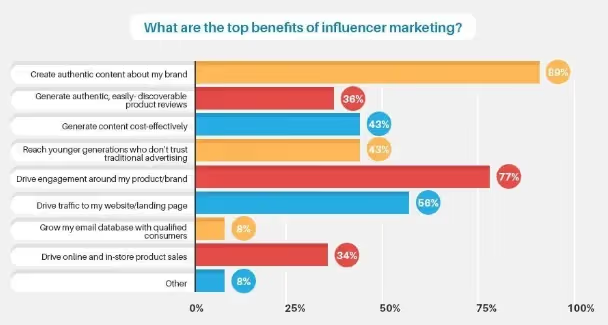
Consumers expect influencers to be transparent and relatable, and any sign of inauthenticity can erode trust. When influencers promote products they don’t genuinely use or believe in, they risk losing credibility with their audience, and brands that associate with them face a similar reputational risk. Thus, influencer verification is of huge importance.
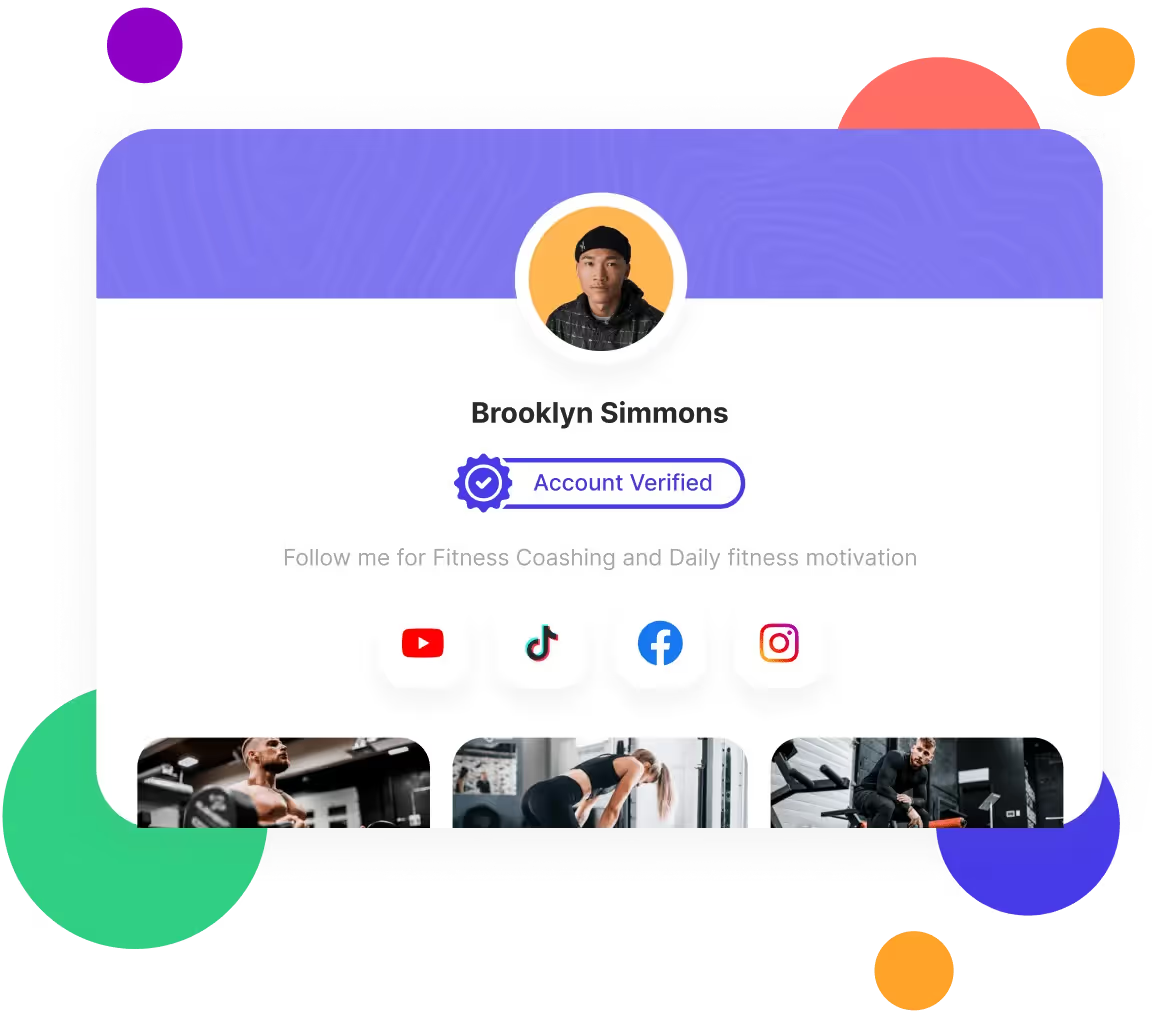
In this blog, we will explore the importance of influencer authenticity for brands, how to spot signs of inauthenticity, and best practices for ensuring the influencers you collaborate with align with your brand’s values and foster genuine connections with their followers.
Importance of Influencer Authenticity for Brands
Influencers today are perceived as trusted sources of information, which makes influencer authenticity a trend that can be expected to gain more ground over time.
In fact, with trends like “de-influencing” taking over social media, where influencers speak out against the products and brands they want their followers to avoid, creating genuine connections with a blend of transparency, authenticity, and relatability is more essential than ever before.
Here are three key reasons why brands must prioritize influencer authenticity before launching any marketing campaign:
Influencer Authenticity is Critical for Building Trust
Did you know that 92% of consumers worldwide trust recommendations from friends, family, and now their favorite social media content creators over all other forms of advertising, particularly brand-sponsored content?
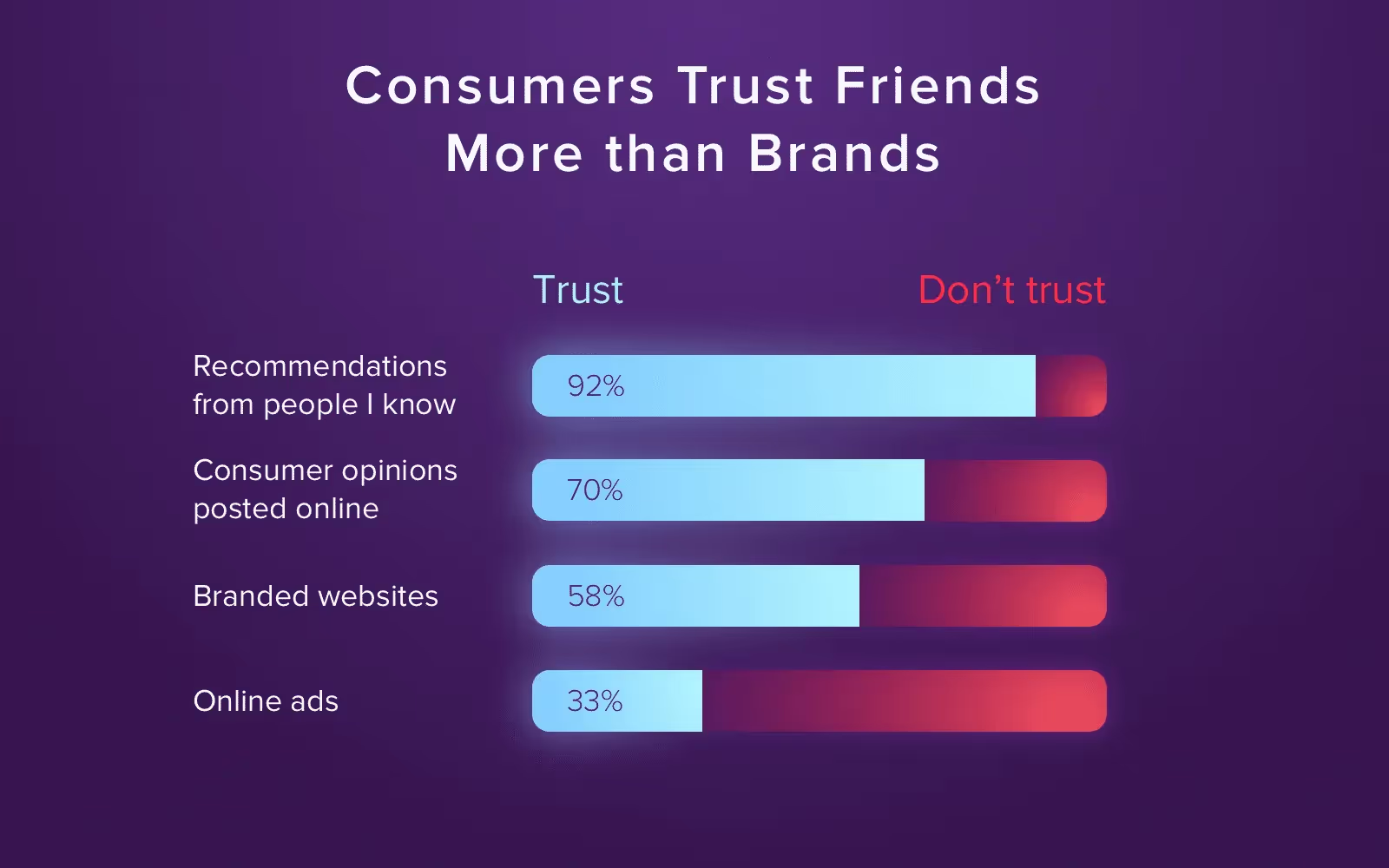
Thus, authenticity in influencer marketing provides a welcome contrast in a world when people are growing more wary of traditional advertisements. By fostering genuine connections and open communication, influencers can boost trust, loyalty, and the effectiveness of brand partnerships. Transparency is crucial here too.
Consumers relate to authentic influencers like their next-door neighbor, which means influencers today need to be true to their real selves while creating content for their audiences. When influencers share honest experiences and personal insights, they’re more likely to resonate with their audience and encourage them to engage with a brand.
Influencer Authenticy Drives Better Engagement and Conversion Rates
Research indicates that 63% of online shoppers are more likely to buy a product recommended by their favorite social media influencer. This is why choosing influencers who understand the power of authentic storytelling is key for promoting your brand.
In the same way, brands that rely on paid digital advertising strategies, such as those offered by a Google ad agency, can benefit from working with influencers who integrate ads authentically within their content.
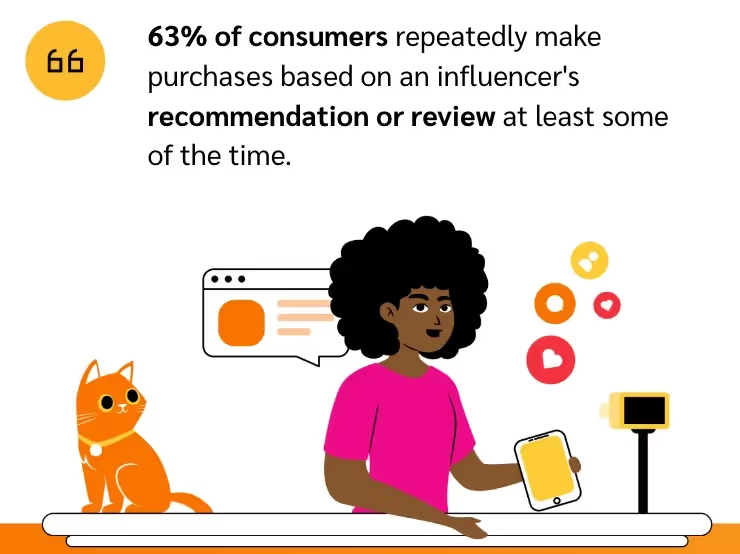
Authentic storytelling means taking the influencer’s audience on a personalized journey, using their voice to highlight your product naturally. By weaving it into an emotional or compelling narrative, influencers can keep their audience engaged, boosting content reach and interaction.
The goal of authenticity is not perfection; instead, it is key to be trustworthy, relatable, and genuine. Influencers who share genuine experiences build stronger connections with their audience, leading to better engagement, more shares, and higher conversion rates. And brands that prioritize authenticity ultimately see better returns on investment.
Risks of Collaborating with Fake or Inauthentic Influencers
Did you know that upto 20% of mid-level influencers are very likely to be fraudulent? This can include promoting brands and products that the influencer does not use or believe in order to buying fake followers, or failing to disclose sponsored content.
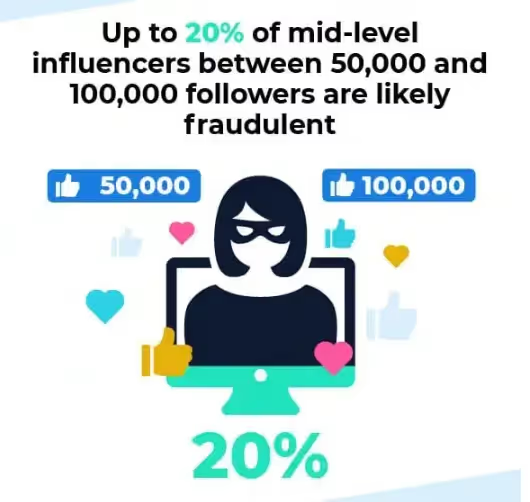
Partnering with inauthentic influencers can damage your brand’s credibility. Consumers today seek genuine endorsements, and when an influencer is seen as dishonest, it erodes trust in both the influencer and the brand. This lack of authenticity can make your brand’s collaboration appear disingenuous, harming consumer relationships.
Additionally, working with inauthentic influencers leads to wasted marketing budgets, as the partnership fails to deliver meaningful engagement or conversions. Poor audience retention and negative perceptions can further undermine the campaign's success, making authenticity essential for impactful marketing.
Now, let’s discuss some common indicators of influencer inauthenticity.
Common Indicators of Influencer Inauthenticity
Here are five key signs of authenticity to watch for when choosing a social media influencer:
- Sudden Surge in Followers: An abrupt increase in an influencer’s follower count can signal the use of paid services to inflate numbers. Authentic growth is gradual and accompanied by genuine engagement.
- Low Engagement Rates: If an influencer has a significant number of followers but receives few likes, comments, or shares, it may indicate that their audience is not genuinely engaged. High follower counts should correlate with active and real-time audience engagement to ensure authenticity.
- Irrelevant or Generic Content: Influencers who repeat product details without personalizing their content may lack genuine enthusiasm. Authentic influencers share relevant, relatable stories that connect with their audience.
- Discrepancies in Engagement Metrics: Significant discrepancies between engagement metrics (likes, comments, and shares) and actual content quality or relevance can be a red flag. For instance, a video with high likes but generic comments or bot-generated responses may indicate inauthentic engagement.
- Overuse of Sponsored Posts: An excessive amount of sponsored content, especially when the promotions are for varied, unrelated brands, can suggest that the influencer is primarily motivated by financial gain rather than authentic endorsements. Genuine influencers integrate sponsored posts naturally and in line with their usual content.
So, how can you ensure influencer authenticity? While you can monitor influencer activity and engagement on your own, it is much easier to use an influencer marketing tool. Investing in an influencer marketing software like Phyllo can help brands vet creators to guarantee that they meet the brand’s standards and expectations and track the performance of campaigns to measure their impact and ensure that they generate positive influencer marketing ROI.
In the following section, we will elaborate on how Phyllo can help you ensure influencer authenticity.
How Phyllo Helps Ensure Influencer Authenticity?
Phyllo is a leading influencer marketing platform that uses its universal API to source creator data from popular social media platforms like Instagram, YouTube, Facebook, and more.

The application acts like a data bridge for developers and marketers, enabling them to make informed decisions about the creators they choose for potential collaboration. With the help of Phyllo’s universal API, you can create an influencer database composed of vetted social media content creators and collaborate with those who show promised results based on key influencer marketing metrics.
Here’s how Phyllo helps ensure influencer authenticity:
Provides Access to Accurate and Real-Time Data: Phyllo’s universal APIs can help you monitor influencer data across 100+ platforms and extract them directly from their source channels thus, ensuring accuracy.
Unlike other third-party data aggregators, Phyllo helps marketers make decisions based on up-to-date information, refreshed in every 24 hours or less. The application even comes with Webhooks, that notify developers any time a creator registered with the platform updates their data. These unique features presented by Phyllo help marketers with various use cases, such as building a YouTube or an Instagram influencer marketing database and monitor influencer activity for inauthenticity.
Monitors and Analyzes Engagement Metrics: The Engagement API from Phyllo can enable marketers to gain insights into engagement metrics, such as like, impressions, comments, and shares. This can be instrumental in assessing content performance and figuring out which type of content works best with an influencer’s audience.

You can also analyze public sentiment and identify trending content topics to make the most of your influencer marketing collaboration and generate positive ROI for your brand. Thus, analyzing engagement rates, follower growth patterns, and influencer activity using Phyllo can help verify an influencer’s authenticity.
Audience Demographics: The Audience API from Phyllo is super useful for retrieving an influencer’s lifetime audience data at the click of a button. You can get insights into characteristics such as age, gender, and country of an influencer’s demographics.

These insights help brands find influencers who align with their target market and campaign goals, ensuring authentic content that resonates with audiences.
Now that you have a comprehensive understanding about influencer authenticity and how Phyllo can help you select authentic influencers, let’s dive into some best practices you can follow for verifying influencer authenticity for your social media campaigns.
Best Practices for Verifying Influencer Authenticity
Brands may find themselves in a never-ending quest for true connections with their target audience as they negotiate the world of digital influence.
There is no one-size-fits-all strategy for obtaining authenticity in influencer marketing.
However, there are a few tried-and-true actions you can take to verify the authenticity of your select influencers:
Using Data-Driven Tools
Data-driven tools are crucial for verifying influencer authenticity because they provide objective metrics on engagement rates, audience demographics, and overall performance.
Platforms like Phyllo can reveal anomalies in follower growth or engagement that might suggest inauthentic behavior, such as purchased followers or inflated metrics.
Analyzing these data points can help brands assess whether an influencer’s reach and impact align with their reported statistics, ensuring they partner with genuinely influencers. In addition, these tools can track trends over time, helping marketers spot emerging patterns of inauthentic behavior.
Manual Audits
Manual audits involve a detailed review of an influencer’s content, audience interaction, and past campaigns. Evaluating the quality and relevance of their content helps determine if it aligns with their claimed expertise and the brand’s values.
Scrutinizing how they interact with their audience—whether they respond genuinely to comments and foster real engagement—can reveal their level of authenticity. Reviewing past campaigns for consistency and effectiveness provides further insight into their reliability and professionalism. This hands-on approach complements data analysis, offering a comprehensive view of an influencer’s true impact.
Cross-Platform Analysis
Checking an influencer’s activity across multiple platforms (Instagram, TikTok, YouTube, etc.) ensures consistency in their brand and engagement metrics. Authentic influencers typically maintain a cohesive presence across channels, reflecting similar content quality and engagement levels.
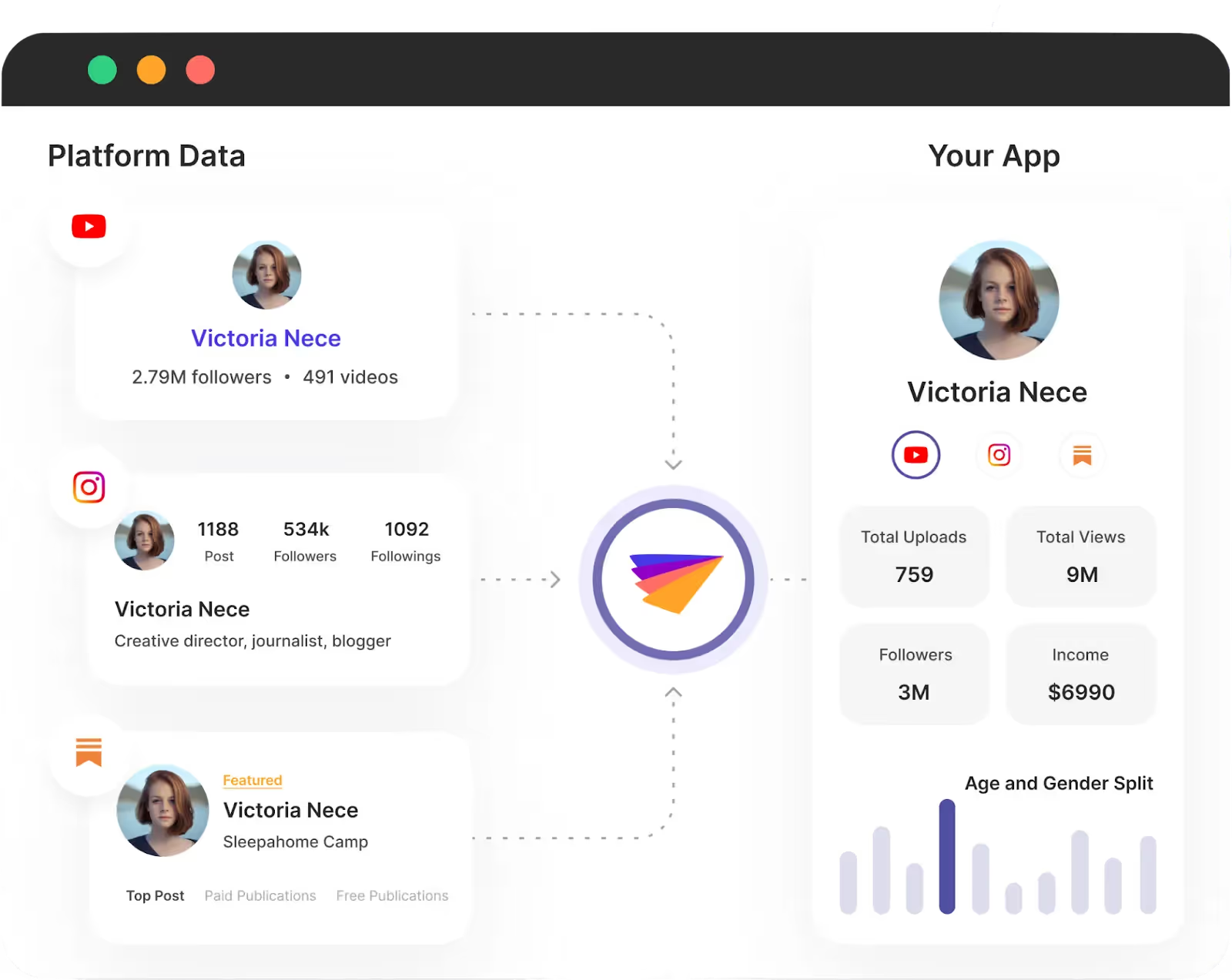
Discrepancies in follower counts, engagement rates, or content style between platforms can indicate potential issues. For example, an influencer with a high follower count on Instagram but minimal engagement on YouTube might suggest inflated metrics or a fake audience. Cross-platform analysis, thereby, helps confirm that the influencer’s online presence is authentic and consistent across the social media landscape.
Thus, combining data-driven tools, manual audits, and cross-platform analysis, brands can more accurately assess an influencer’s authenticity and make informed partnership decisions.
Ensuring Influencer Authenticity with Phyllo!
Authenticity in influencer marketing is more crucial than ever in a time when online audiences and influencers are actively criticizing brands for oversaturation and false messaging.
Authentic influencing fosters loyalty, trust, and a sincere connection with customers. Customers today expect influencers to communicate and interact with them in a genuine, trustworthy, honest, and transparent manner—and influencers can do so by simply being sincere, relevant, and consistent in engaging with followers.
Influencer authenticity is thus a powerful driving force that can turn a creator’s followers into a loyal brand community.

Want to collaborate with authentic influencers who can create personalized content to boost your brand’s reach and enhance your conversation rates? Try out Phyllo!
As demonstrated above, Phyllo’s universal API can help marketers access real-time data sourced directly from multiple social media platforms, analyze influencer activity and engagement, and ensure that an influencer’s audience demographics matches the brand’s ideal customer personas and aligns with the latter’s campaign goals.
Furthermore, the new social media listening and social media screening APIs launched by Phyllo can enable you to evaluate public sentiment, identify trending topics, monitor influencer performance, and analyze profiles for safety to prevent you from partnering with influencers who will damage your reputation or let your marketing budget go to waste!
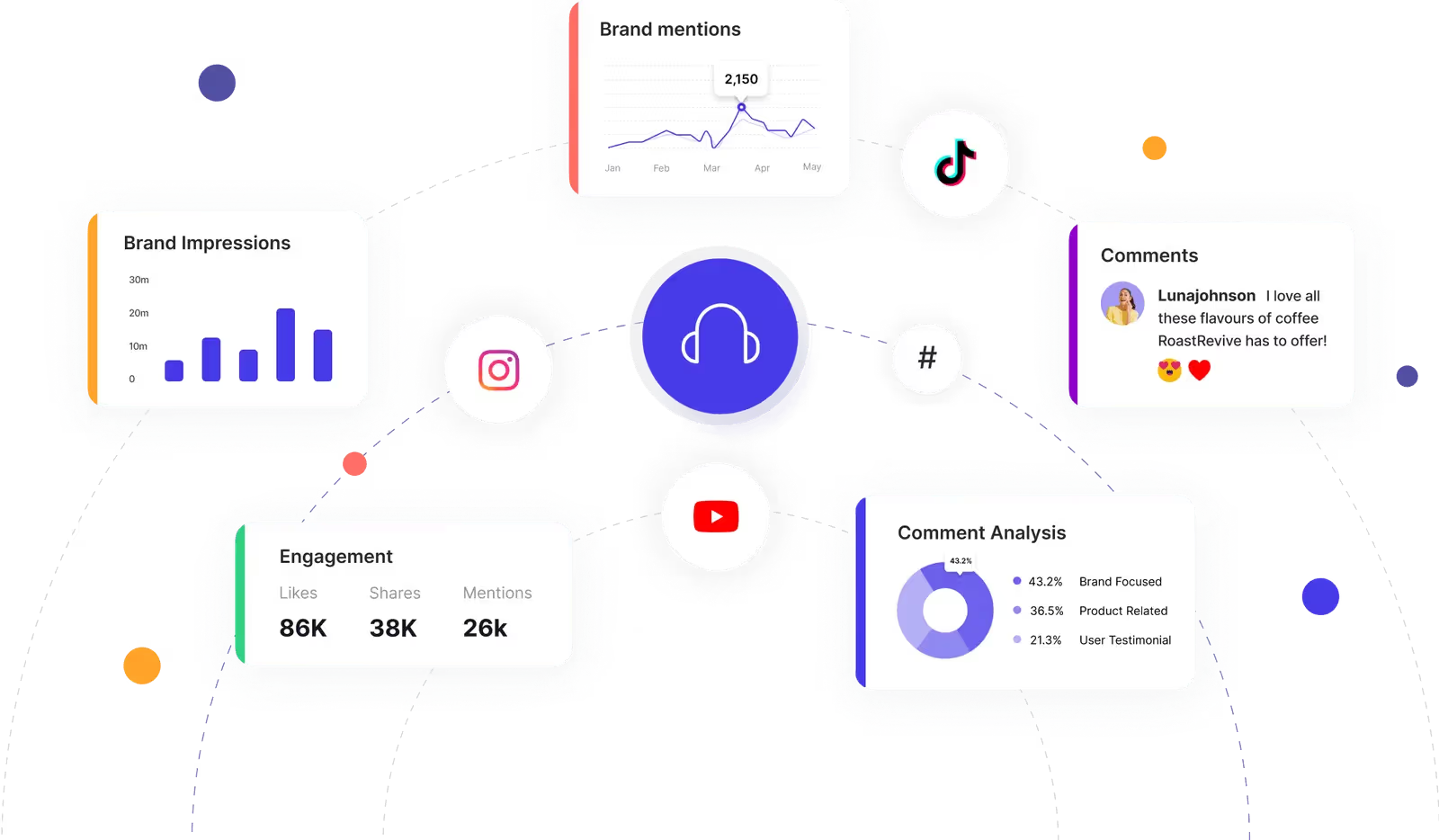
Book a FREE demo with Phyllo to learn more about how you can engage authentic influencers for your influencer marketing success today!
%20(1).webp)

.avif)








.avif)
.avif)
.avif)